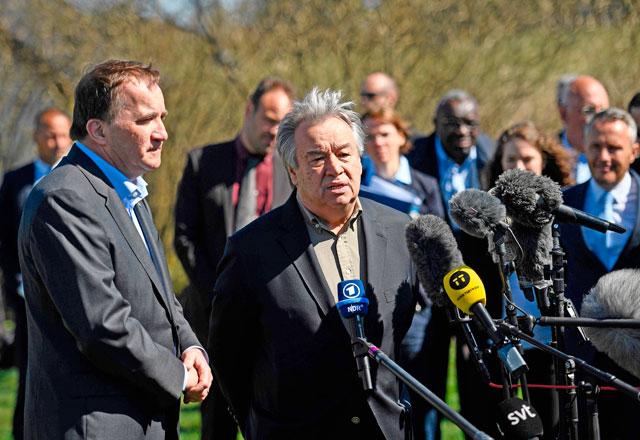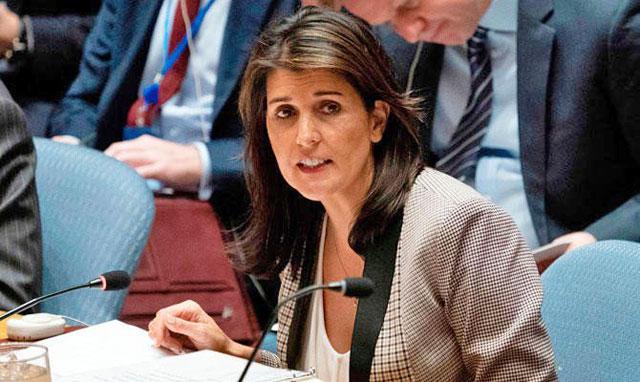You are here
At the UN, a diplomatic dance decides the fate of nations
By AFP - Mar 04,2018 - Last updated at Mar 04,2018
UNITED NATIONS, United States — The issues that come before the UN Security Council are the gravest to face any decision making body — questions of war and peace, life and death.
But when world diplomats are building towards a weighty decision, almost any diplomatic tactic seems fair game, even sleight of hand.
All the envoys in endless daily meetings in the vast glass-walled tower on Turtle Bay, New York, would say they are seeking consensus.
But how, then, to ensure that the Council's decision reflects their own national interest?
"It plays out on a personal level. Without trust, we'd get nowhere," a diplomat told AFP, speaking on condition of anonymity to explain the process.
Within the past week, for example, the world body united to back an unlikely ceasefire in Syria's endless war, but failed to agree on censuring Iran.
The United States wanted to single out Tehran for its alleged interference in the Yemen conflict, but Russia stepped in and headed off the initiative.
In each case, the battle lines were almost the same, with America and its allies opposing Russian and Iranian interventions in two regional wars.
So why was the diplomatic outcome different?
"In any negotiation, the key is personal relationships," the diplomat explained.
Whatever the stark differences between the public positions of the rival member states, in the UN building diplomats work together every day.
Cautious friendships and friendly rivalries develop — along with occasional feuds — and personal power plays can decide matters of state.
"In private, relationships are less tragic than they seem in public," another diplomat admits.
Washington's ambassador, former South Carolina governor Nikki Haley, is the only politician in a council staffed by veteran career diplomats.
Last year, she pulled off an impressive diplomatic coup when she brought China and Russia on board multiple times to secure unanimous support for North Korea sanctions.
But on Monday, Haley delegated the US seat to a colleague and was in Honduras when Russia moved in to halt efforts to condemn Iran.
Sometimes, a consensus is found through a savvy manipulation of procedure.
Last year, China balked at a resolution to condemn its neighbour Myanmar, but allowed the chairman of the Security Council to issue a declaration or PRST.
In theory a PRST ought to be no easier to agree upon than a resolution, since any one of 15 council members can object to elements of the text.
But diplomats had suggested the resolution first before falling back on the PRST, allowing China to appear to have won a concession.
As a diplomat recalled, it's important to allow an opponent and option to "save face".
In long negotiations on fraught subjects, like the slaughter in Syria, the winning side is often the one that keeps its cool longest.
Constant dialogue
"You need to respect the other side when it reveals the red lines it will not cross," one negotiator told AFP, while another said: "It's hard on the nerves."
However the talks go before a vote, most ambassadors check with their national capitals before assenting, abstaining or imposing a veto.
Haley has the most personal freedom to maneuver, being a member of President Donald Trump's administration with Cabinet rank.
But she is also one of the more inexperienced envoys in a building that hosts constant dialogue, in corridors, conference rooms and text messages.
Murmured conversations continue in the carpeted lobbies outside the Security Council chamber and even in the "Quiet Room" waiting area.
One conference room is set aside for the veto-wielding Permanent Five: Britain, China, France, Russia and the United States.
Another hosts the ten non-permanent members.
When a new issue comes up for discussion, national experts meet to size up the diplomatic terrain.
Then it is either the job of the "coordinators" from each mission to draw up the terms of the debate; otherwise, the ambassadors or their deputies take the reins.
Specific roles are handed out. One country on a rolling basis is president of the council, but each issue also has an influential "penholder".
All members will eventually vote on each resolution, but the draft is drawn up by the penholder.
So for the war in Syria, Kuwait and Sweden have taken the lead. For texts dealing with Yemen or Myanmar, Britain has an outsized role.
Pivotal role
Sometimes, if consensus proves elusive, a country can switch or augment its role.
In recent discussions about Syria, for example, France has become a "facilitator" and China has been invited to small group meetings.
Haley, who had been on a trip to Chicago, did not take part in the discussions until the last minute, diplomats say.
Russian Ambassador Vassily Nebenzia, meanwhile, told AFP he had thanked France's Francois Delattre by text message for taking a pivotal role in the ceasefire.
Finally, theatrical gestures sometimes pay off.
On February 22, all 10 ambassadors from non-permanent members appeared together in front of the press to exhibit their joint concern at Russia's stalling.
Two days later, the world was wondering whether Russia would agree to the Syrian truce.
UN television cameras suddenly jumped to Haley and Delattre arriving together, apparently complicit, in the Security Council chamber.
"We were within inches of failure," a diplomat said, adding it was a "rare gesture" to tempt fate and put pressure on Russia to vote.
It worked. The other members assembled and voted.
Related Articles
BackAkra, Sweden — The UN Security Council met in a secluded farmhouse on the southern tip of Sweden on Saturday in a bid to overcome deep d
UNITED NATIONS, United States — The UN General Assembly will vote Thursday on a US-drafted resolution condemning the Palestinian Hamas movem
UNITED NATIONS — The UN Security Council on Tuesday demanded that hospitals and clinics be protected in war zones, in a resolution that draw


















